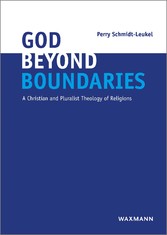Suchen und Finden
Service
Book Cover
1
Imprint
4
Contents
7
Preface to the English Edition
13
Preface
15
1. Introduction
19
October 27, 1986 – September 11, 2001
19
Interreligious Encounter and the Emergence of Pluralism
20
An Outline of the Argument
26
Part I: The Need for a Christian and Pluralist Theology of Religions
29
2. Theology of Religions: What’s It About?
31
The Dual Question Addressed by the Theology of Religions
31
The Dogmatic Problem
34
The Practical Problem
36
The Criteriological Problem
41
The Hermeneutical Problem
50
The Apologetic Problem
55
3. Classifying the Options
58
The Tripartite Classification
58
A Logically Comprehensive Classification
60
Clarification of Terms
67
A Discussion of Some Objections
69
Comparative Theology as an Alternative?
80
4. A Critique of Christian Exclusivism
88
Forms of Exclusivism
88
Exclusivism in the History of Theology: An Overview
91
Recent Developments
98
Critical Discussion
104
The Question of Salvation
104
The Question of Interreligious Parallels
111
5. A Critique of Christian Inclusivism
116
Inclusivism in the History of Th eology: An Overview
117
Recent Developments
124
Post-Conciliar Doctrinal Developments in the Roman Catholic Church
124
Pluralizing Inclusivism: Mark Heim and Jacques Dupuis
125
Critical Discussion
136
Evaluating Religious Diversity
137
Insuffi cient Empirical Evidence
140
Dogmatic Evidence?
144
6. Religious Pluralism
147
Pluralism in the History of Theology: An Overview
147
Pluralist Approaches in Other Religions
154
Clarifications and Distinctions
158
Polycentric Pluralism?
158
Pluralism and the Ability to Dialogue
161
Pluralism and Religious Tolerance
162
Problems of a Pluralist Theology of Religions
164
On the Theoretical Status of a Pluralist Theology of Religions
165
Philosophical Consistency?
168
Theological Consistency?
170
Pluralism — a Christian Option
170
Part II: Presuppositions of a Christianand Pluralist Theology of Religions
173
7. Belief in a Transcendent Reality
175
The Concept of Transcendent Reality
175
The Inconceivability of Transcendent Reality
179
The Relevance of Transcendent Reality
187
8. Revelation and Experience
190
Revelation as Divine Self-Disclosure
190
Receiving Revelation via Religious Experience
194
Experience and Interpretation
197
The Perspectivity of Religious Experience
200
9. Religious Language and Experience
203
How and Why We Must Speak about God
203
A Logical Reason and the „via negativa“
204
A Semantic Reason and the „via eminentiae“
206
A Spiritual Reason and the „via affirmativa“
209
Consequences for a Pluralist Theology of Religions
212
John Hick’s Hermeneutics of Religious Language
212
Contradictory Truth Claims? On the Consistency of the Pluralist Solution
218
10. Revelation, Salvation, and Religion
222
What Does “Salvation” Mean?
222
Salvation as the Purpose of Revelation
227
The Salvific Significance of the Religions
228
Faith, Relationship to God, and Religion
228
The Universal Possibility of Salvation
232
The Chance of Salvation and the Salvific Situation
233
Soteriocentrism
235
11. Revelation, Incarnation, and the Mediation of Salvation
239
Jesus as Revealer
239
Jesus as Mediator of Salvation
243
Jesus as Incarnation
251
How to Interpret Chalcedon?
252
Incarnation as a Singularity or Basic Feature of Divine Immanence?
258
The Doctrine of the Trinity in Pluralist Perspective
262
Potential Pluralism — and Nothing More?
267
Part III: Testing a Christian and Pluralist Theology of Religions in Interreligious Encounter
271
12. Christianity and Judaism
273
Christian Anti-Judaism
273
Historical Overview
273
Theological Roots of Christian Anti-Judaism
278
Inclusivist Openings
281
The Unrevoked Covenant
281
The Issue of Missionizing the Jews
286
Pluralizing Developments or an Inclusivist Alliance?
289
Rosemary Radford Ruether
292
Pluralist Perspectives
299
On the Christian “Yes” and the Jewish “No” to Jesus
299
Election and the Plurality of Religions
305
13. Christianity and Islam
310
Historical Burdens
310
Who is Surpassing Whom? Conquests, Reconquests, and their Religious Background
310
Islam from a Christian Exclusivist Perspective
315
Inclusivist Openings
323
The Significance of the Second Vatican Council
323
Muhammad and Jesus in the Writings of Kenneth Cragg
327
Wilfred Cantwell Smith
334
Pluralist Perspectives
338
Incarnation and Trinity
338
Muhammad and Jesus
340
Pluralist Islam
348
14. Christianity and Hinduism
352
Colonialism and Neo-Hinduism
352
The Beginnings of Indian Christianity
352
Christian Mission under Portuguese and British Rule
353
The Neo-Hindu Response
356
Inclusivist Openings
359
“The Crown of Hinduism”
360
Catholic Inclusivism aft er the Second Vatican Council
363
Raimon Panikkar
366
Pluralist Perspectives
371
Mutual Enrichment
371
A Pluralist Theology of Religions and the Question of Caste
376
Repressive Tolerance?
380
15. Christianity and Buddhism
383
On the History of Christian-Buddhist Encounter
383
An Explosive Pre-History?
383
Historical Burdens
386
Mutual Exclusivism
390
Inclusivist Openings
397
Lynn A. de Silva
402
Pluralist Perspectives
407
Christian-Buddhist Complementarity
407
Christian-Buddhist Relativization
412
16. Steps to the Future
422
A Plausible Theological Hypothesis
422
Practical Consequences
424
Toward a World Theology
429
Interreligious Spirituality
432
Bibliography
438
Index of Names
474
Alle Preise verstehen sich inklusive der gesetzlichen MwSt.








